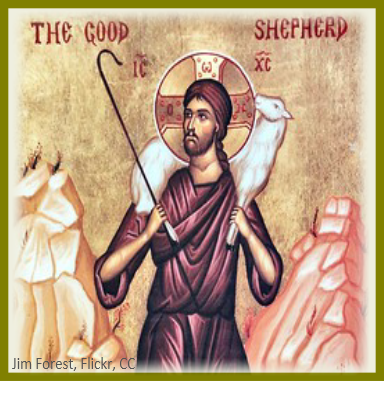Readings: Acts 2:14, 36-41; 1 Peter 2:20-25; John 10:1-10
Theme: ‘I have come that you may have life and have it abundantly’ (Jn 10:10)
Today is World Day of Prayer for Vocations, a day when we are invited to reflect on the meaning of God’s call to leadership and to pray for vocations. To help us reflect on the meaning of vocation – a call to serve others -the Church, in today’s Gospel, presents us with the figure of Jesus, the Good Shepherd, who not only looks after the sheep in his care, but is ready to risk his life for them.
At the time in which Jesus lived, there were two kinds of shepherds in Israel. There was the hired hand for whom minding the sheep was just a job. He would move from one flock to another depending on the conditions of service, but would never dream of risking his life for them. If he saw wolves or thieves approaching, he would flee for dear life and leave the flock to the mercy of the marauders. Then there was the shepherd-owner of the flock who stayed with the same flock all his life. He knew every sheep in his flock individually and had a name for each one. The shepherd-owner was devoted to his sheep. He knew the one that was likely to lag behind the others on a long trek, and he would lift it up and carry it in his arms. He knew the ones that were likely to stray from the flock and kept his eye out for them when passing through dangerous terrain. When attacked by wolves or thieves, he would fight to protect his sheep and even lay down his life for them: ‘The good shepherd lays down his life for the sheep’ (Jn 10:11)
The expression ‘laying down one’s life’ comes from the practice in Israel of keeping the sheep in an enclosed space called a ‘field pen’. In his book about the Holy Land, John Kellman tells us that a field pen consisted of a circular stone wall about four feet high with a narrow opening in it. The pen didn’t have a gate. The shepherd himself was the gate. Hence the significance of Jesus’ words in today’s gospel reading: ‘I am the gate of the sheepfold’ (Jn 10: 7). At night the shepherd would lie down across the opening so that the sheep would not wander out, or wolves enter in. Any intruder would literally have to cross over his body. This background gives us an insight into what Jesus had in mind when he stated, ‘I am the Good Shepherd’ (Jn 10:11). His concern and care for us is like that of the shepherd-owner for his sheep. Like the shepherd, he knows and understands us better than we know ourselves. Jesus cares for his flock, leads them, calls them by name. And all of this is a manifestation of the reason he has come among us: ‘so that they may have life and have it abundantly’ (Jn 10:10).
What the Lord said to his chosen people through the prophet, Isaiah, Jesus says to each of us personally: ‘Do not be afraid… I have called you by name… You are precious to me… Do not be afraid, I am with you’ (Is 43:,1,4-5). And he has laid down his life for love for us. In the words of John’s gospel, repeated in the Fourth Eucharistic prayer, ‘Having loved those who were his own in the world, he loved them to the end’ (Jn 13:1). In a culture in which leaders ‘made their authority felt’ and insisted on others serving them obsequiously, Jesus modeled a leadership of loving service without conditions or limits. To illustrate what it meant to be a good shepherd and give one’s life in the service of others, he even washed his disciples’ feet – the action of a slave!
Today’s gospel challenges all those involved in leadership and pastoral ministry in the Church to emulate the generosity and selflessness of Jesus, the Good Shepherd. In a homily he gave to priests in 2016, Pope Francis reminded them that they are ‘must be joyful, stubborn shepherds who take risks and seek out even those who are most distant from God, in imitation of the Good Shepherd, Jesus Christ. He went on to say: ‘you must have hearts sufficiently free to set aside your own concerns. You must not live by calculating your gains or counting the hours you have worked. The priest is not an accountant of the Spirit, but a Good Samaritan who seeks out those in need.” Shepherd leaders are those who, in the words of Michael Fitzgerald MAfr and Rene Dionne Mafr. ‘reach out to strengthen the fearful, protect the weak, lift up the fallen, embrace the dying, share burdens and wipe away tears, open doors closed by despair, discover the best in others and set it free’. When people begin to see that their leaders are not just doing a job but relating to people personally and truly caring for them, then, perhaps they see the true meaning of Christian vocation and be more willing to opt for this ministry of service.
Let us pray for all involved in pastoral ministry that they may display in their work the qualities of the good shepherd, not those of the hired hand.
Michael McCabe SMA
To listen to an alternative Homily for this Sunday, from Fr Tom Casey of the SMA Media Centre, Ndola, Zambia please click on the play button below.
|
|

